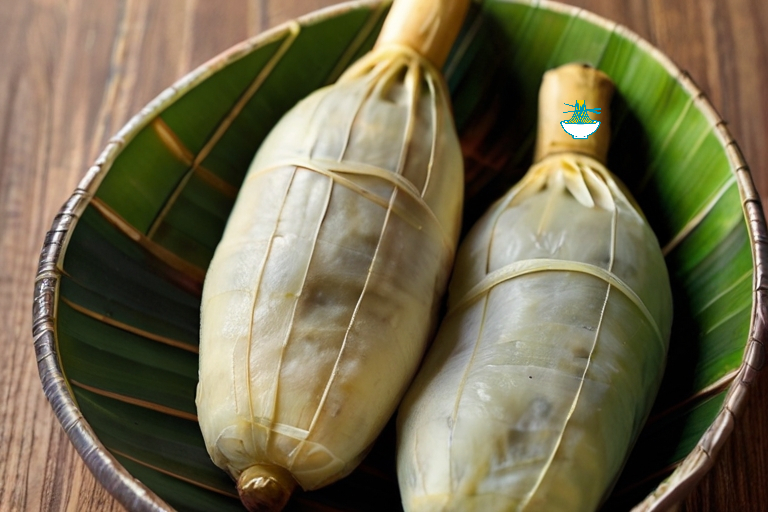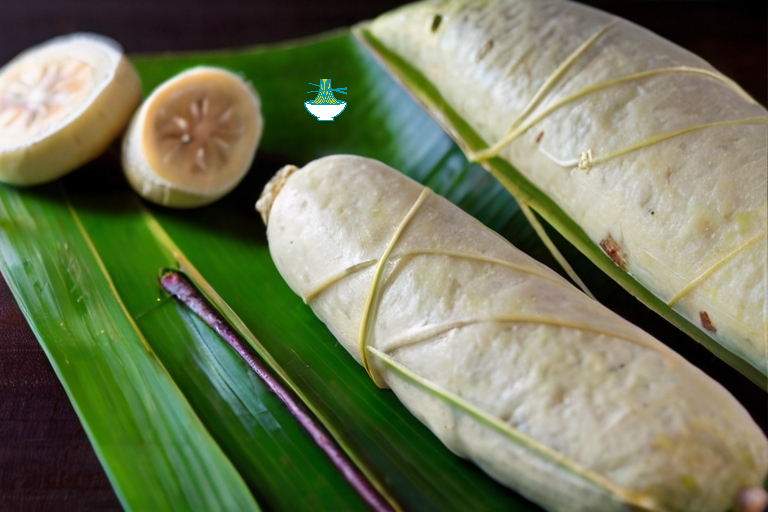Indulge in the vibrant flavors of Cameroon with this delightful Kwacoco recipe. Hailing from the heart of West Africa, Kwacoco is a beloved dish cherished for its rich combination of ingredients and cultural significance. Rooted in tradition and passed down through generations, this recipe offers a glimpse into the culinary heritage of Cameroon.
With its base of cassava leaves, enhanced by aromatic spices and tender pieces of meat or fish, Kwacoco tantalizes the taste buds and satisfies the soul. Whether enjoyed with family and friends during festive gatherings or savored as a comforting meal on a cozy evening, this dish promises to transport you to the bustling markets and warm kitchens of Cameroon.
Join us on a culinary journey as we explore the intricacies of preparing Kwacoco, celebrating the diversity and richness of Cameroonian cuisine. With each bite, savor the essence of tradition and the joy of sharing a delicious meal with loved ones. Let's embark on this flavorful adventure together, honoring the culinary heritage of Cameroon through the art of Kwacoco.

Ingredients:
- 2 cups of cassava leaves, finely chopped
- 2 cups of cassava flour
- 1 cup of palm oil
- 1 onion, finely chopped
- 2 cloves of garlic, minced
- 1 teaspoon of ground crayfish
- 1 teaspoon of ground white pepper
- Salt to taste
- 1 cup of water
- Banana leaves for wrapping
Instructions:
Prepare the Cassava Leaves:
1- Rinse the cassava leaves thoroughly under cold water to remove any dirt or debris.
2- Finely chop the cassava leaves and set them aside.
Prepare the Dough:In a large mixing bowl, combine the cassava flour with water to form a smooth, pliable dough. Knead the dough well until it is soft and elastic. Set aside.
Cook the Cassava Leaves:
1- Heat the palm oil in a large skillet over medium heat.
2- Add the chopped onions and minced garlic to the skillet. Sauté until the onions are soft and translucent.
3- Stir in the chopped cassava leaves and continue cooking for about 5-7 minutes, until the leaves are wilted and tender.
4- Season the mixture with ground crayfish, ground white pepper, and salt to taste. Stir well to combine.
Assemble the Kwacoco:
1- Take a banana leaf and cut it into rectangular pieces, about 8 inches long.
2- Place a spoonful of the cassava dough onto the center of each banana leaf piece.
3- Flatten the dough slightly with your fingers, then spoon some of the cooked cassava leaf mixture on top of the dough.
Wrap and Boil:
1- Fold the banana leaf over the filling to form a neat parcel. Secure the ends by folding or tying with kitchen twine.
2- Repeat this process until all the dough and filling are used up.
3- Bring a large pot of water to a boil. Carefully place the wrapped Kwacoco parcels into the boiling water.
4- Boil for about 45 minutes to 1 hour, or until the dough is cooked through and firm to the touch.
Serve:
1- Once cooked, remove the Kwacoco parcels from the water and allow them to cool slightly.
2- Unwrap the banana leaves and serve the Kwacoco hot, either on its own or with your favorite side dishes.
Enjoy your authentic Cameroon Kwacoco, bursting with flavor and tradition!
Nutritional Values:
Here's an approximate nutritional breakdown for the ingredients used in the Cameroon Kwacoco recipe:
Cassava Leaves (2 cups, finely chopped):
- Calories: 36 kcal
- Carbohydrates: 8.6 g
- Protein: 0.5 g
- Fat: 0.1 g
- Fiber: 1.4 g
- Vitamin C: 24 mg
- Vitamin A: 1700 IU
- Iron: 0.3 mg
benefits:
- Rich in Vitamin C, which supports immune function and collagen production.
- Good source of Vitamin A, important for vision and skin health.
- Contains iron, essential for the production of red blood cells and oxygen transport in the body.
- Provides dietary fiber, promoting digestive health and regularity.
Cassava Flour (2 cups):
- Calories: 760 kcal
- Carbohydrates: 190 g
- Protein: 2 g
- Fat: 0 g
- Fiber: 6 g
- Calcium: 20 mg
- Iron: 2.7 mg
benefits:
- High in carbohydrates, providing sustained energy.
- Contains dietary fiber, aiding in digestion and supporting gut health.
- Good source of iron, necessary for preventing anemia and supporting overall health.
Palm Oil (1 cup):
- Calories: 1928 kcal
- Total Fat: 218 g
- Saturated Fat: 38 g
- Monounsaturated Fat: 120 g
- Polyunsaturated Fat: 45 g
- Vitamin E: 45 mg
- Vitamin K: 24 mcg
benefits:
- High in Vitamin E, an antioxidant that helps protect cells from damage.
- Contains healthy fats, including monounsaturated and polyunsaturated fats, which support heart health.
- Provides Vitamin K, important for blood clotting and bone health.
Onion (1 onion, finely chopped):
- Calories: 44 kcal
- Carbohydrates: 10 g
- Protein: 1 g
- Fat: 0 g
- Fiber: 2 g
- Vitamin C: 10 mg
benefits:
- Rich in Vitamin C, boosting immunity and promoting skin health.
- Contains antioxidants that help reduce inflammation and fight oxidative stress.
- Provides dietary fiber, supporting digestive health and weight management.
Garlic (2 cloves, minced):
- Calories: 8 kcal
- Carbohydrates: 2 g
- Protein: 0 g
- Fat: 0 g
- Fiber: 0 g
- Vitamin C: 1.4 mg
benefits:
- Known for its antimicrobial properties, helping to fight infections and boost immunity.
- Contains compounds like allicin, which may help lower cholesterol and blood pressure.
- Provides antioxidants that help protect cells from damage and reduce the risk of chronic diseases.
Ground Crayfish (1 teaspoon):
- Calories: 5 kcal
- Protein: 1 g
- Fat: 0 g
- Fiber: 0 g
benefits:
- Good source of protein, essential for building and repairing tissues in the body.
- Contains minerals like calcium and phosphorus, important for bone health.
- Adds flavor to dishes without adding extra fat or calories.
Ground White Pepper (1 teaspoon):
- Calories: 6 kcal
- Carbohydrates: 1.3 g
- Protein: 0.3 g
- Fat: 0.1 g
- Fiber: 0.6 g
benefits:
- Contains capsaicin, which may help boost metabolism and aid in weight loss.
- Provides antioxidants that help reduce inflammation and protect against chronic diseases.
- Adds a spicy kick to dishes without adding extra sodium.
Salt (to taste):
- Nutritional values vary based on the type and quantity used.
benefits:
- Essential for maintaining fluid balance in the body and regulating blood pressure.
- Enhances flavor in dishes and helps balance other flavors.
Water (1 cup):
- No calories, carbs, protein, or fat.
benefits:
- Essential for hydration and overall bodily functions, including digestion, circulation, and temperature regulation.
- Helps transport nutrients to cells and remove waste products from the body.
Banana Leaves (for wrapping):
- Negligible caloric and nutritional value.
benefits: While banana leaves are not typically consumed, they are often used for wrapping foods in traditional cooking, providing a natural and eco-friendly alternative to aluminum foil or plastic wrap. They help retain moisture and impart a subtle aroma to the dish.
Please note that these values are approximate and may vary based on factors such as brand, cooking methods, and specific varieties of ingredients used.


Comments